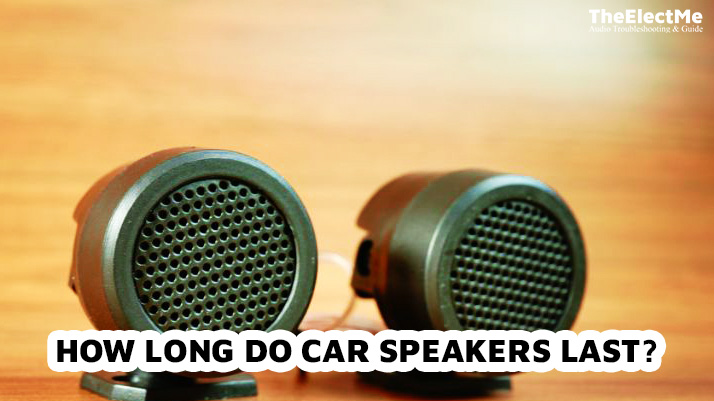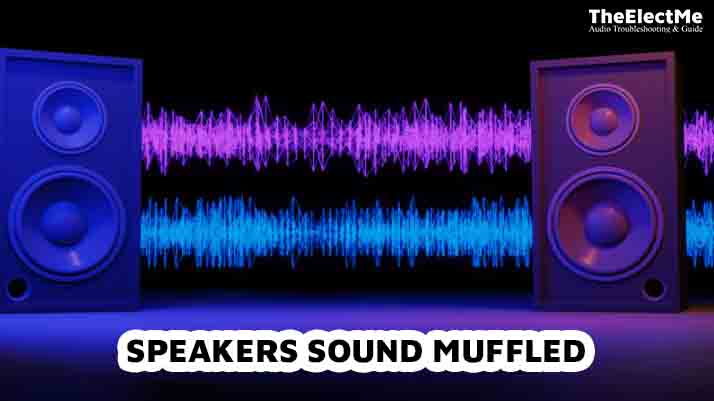How many times have you gotten in your car, turned on the radio, and been disappointed by the sound quality of your speakers? If this happens often, consider replacing your car speakers. But before you do, let’s look at how long car speakers typically last and what can affect their lifespan.
Generally, 4 to 8 years is the average lifespan of car speakers, but this can vary depending on several factors. For example, the better quality and care you provide for your speakers, the longer they will likely last. The type of speakers and how often they are used can also affect their longevity.

Let’s explore the precise life expectancy of car speakers.
How Long Do Car Speakers Last? A Statistic Overview
The average lifespan of car speakers is influenced by many factors, including their quality, usage, and care.
According to a discussion on diymobileaudio.com, car speakers should last at least five years, and with regular use at low-to-moderate volumes, it’s easy to attain ten or more years.
Contrarily, factory-installed speakers may fare less well over time. As per an article on crutchfield.com, these speakers can deteriorate over time, especially if subjected to high volumes frequently.
Generally, most car speakers can last anywhere from 4 years to 8 years.
Here’s a comparison table for three common types of car speakers: Coaxial, Component, and Subwoofers.
comparison table for three common types of car speakers
| Speaker Type | Sound Quality | Installation Difficulty | Price Range |
|---|---|---|---|
| Coaxial | Good | Easy | $50 - $200 |
| Component | Excellent | Moderate to Hard | $100 - $1000 |
| Subwoofers | Varies (Bass Enhancement) | Hard | $100 - $1500 |
Coaxial Speaker
These are the most common types of car speakers. They provide good sound quality and are generally easy to install. They are also the most affordable, usually from $50 to $200.
Component Speakers
These speakers provide excellent sound quality due to the separation of the tweeter and woofer. However, they are more challenging to install than coaxial speakers and are generally more expensive, typically ranging from $100 to $1000.
Subwoofers
Subwoofers enhance the bass in a car audio system. Their sound quality varies depending on the rest of the audio system. They are generally the most difficult to install and can range from $100 to $1500 in price.
Please note that these are general price ranges and actual costs can vary greatly depending on the brand, model, and where you purchase the speakers.
Let’s explore the factors that can affect the lifespan of car speakers.
Related Post: Why Is My Bose Speaker Not Connecting To Bluetooth?
What Are The Factors That Affect The Lifespan Of Car Speakers?
The lifespan of car speakers can vary greatly depending on several factors. Here are some of the critical elements that can affect how long your car speakers last:
Usage
Regular use of car speakers at low-to-moderate volumes can significantly extend their lifespan. This is because the speaker’s components, such as the cone and coil, are less likely to be stressed under these conditions.
High volumes, especially for prolonged periods, can cause these parts to wear out faster, leading to distortion or failure. Therefore, maintaining a moderate volume level not only ensures better sound quality but also improves the longevity of your car speakers.
Quality of the Speaker
The durability of car speakers dramatically varies depending on their quality. Top-notch speakers use durable materials to endure regular use and harsh conditions, ensuring a longer lifespan.
On the other hand, cheaper, lower-quality speakers may be less durable, leading to a shorter lifespan. For example, speakers with rubber surrounds typically outlast foam surrounds due to the rubber’s durability and resistance to dry rot. Can I improve performance of speakers? You can use multiple techniques to improve the speaker’s performance.
Exposure to Heat
Heat can have a detrimental effect on the lifespan of car speakers. Excessive heat can cause the adhesive holding the various parts of the speaker together to weaken, leading to component separation over time.
Moreover, it can cause the voice coil to overheat, permanently damaging it. Therefore, avoiding exposing your car speakers to high temperatures for extended periods is advisable.
Factory Installed vs Aftermarket Speakers
When comparing factory-installed speakers to aftermarket speakers, the latter often have a longer lifespan. This is primarily because aftermarket speakers are usually made with higher-quality materials and are better engineered.
Factory-installed speakers, while convenient, are often designed with cost in mind, possibly compromising quality and lifespan. However, the longevity of both types can be improved with proper care and usage.
These are the factors that can impact the lifespan of car speakers. Let’s explore the tips for extending the life of your car speakers.
Related Post: How Much Do Speakers Cost?

How Do You Extend The Lifespan Of Car Speakers?
Here are some tips to help extend the lifespan of your car speakers:
- Regular Cleaning: Dust and dirt can accumulate on your speakers over time, affecting their performance and potentially causing damage. Regular cleaning using a soft cloth or compressed air can help to prevent this.
- Avoid Excessive Volume: Playing music at high volumes for extended periods can stress your speakers and may lead to wear and tear over time. It’s best to keep the volume moderate to avoid straining the components.
- Proper Installation: Ensure that the speakers are correctly installed. Poor installation can lead to vibration and other issues that can shorten the lifespan of the speakers. If you need more confidence about installing the speakers, it’s best to have them installed by a professional.
- Avoid Moisture: Speakers are not designed to handle moisture, and exposure can lead to rusting and other forms of damage. Try to keep the interior of your car as dry as possible.
- Park in the Shade: As mentioned earlier, heat can cause damage to your speakers. Try to park your car in the shade whenever possible, especially during the hotter months of the year.
- Regular Inspection: Inspect your speakers for any damage or wear. This could include distortion in the sound, which might indicate that a part is wearing out and needs to be replaced.
By following these care tips, you can help ensure that your car speakers last as long as possible. However, sure signs appear over time and may indicate that it’s time to replace your car speakers.
Related Post: Speaker Placement In Small Room: How To Set It Correctly?

What Are The Signs That Indicate A Need For Replacing Car Speakers?
Recognizing the signs that your car speakers need replacement can help you maintain a high-quality audio experience in your vehicle. Here are some common indicators:
- Distorted Sound: This is one of the most obvious signs. If the sound coming from your speakers is distorted or fuzzy, it could mean that the speaker cone or voice coil has been damaged.
- Weak or No Sound: If the sound from your speakers is significantly weaker than usual, or if there’s no sound at all, it’s a clear sign that something is wrong. The problem could be with the wiring, amplifier, or speakers.
- Rattling or Buzzing Sounds: These noises could indicate a blown speaker. This usually occurs when the speaker’s cone becomes detached from the rest of the component.
- Inconsistent Sound Output: If the sound quality varies between different speakers, it could mean that one or more of them need to be replaced.
- Lack of Bass or Treble: If your music sounds flat and lacks depth, it could indicate that your speakers must be working correctly. Good speakers should be able to handle a wide range of frequencies.
- Physical Damage: Visible damage to the speaker, such as a torn cone or a broken frame, is a sure sign that it needs to be replaced.
- Aging Speakers: Even if your speakers aren’t showing these signs, their performance can still degrade over time. If your speakers are old and you’re unhappy with the sound, it might be time for an upgrade.
Remember, it’s best to consult a professional if you’re experiencing issues with your car speakers. They can accurately diagnose the problem and advise you on the best action. Another reason the speaker produces poor-quality sound in improper timbre matching. How to timbre match a speaker?
Conclusion – How Long Do Car Speakers Last?
To summarise, the average lifespan of car speakers is around 4-8 years, but various factors can influence this. Well-kept and properly installed speakers can last longer, but extreme heat or moisture can shorten their lifespan.
It’s essential to take proper care of your car speakers to ensure they last as long as possible. Regular cleaning, avoiding excessive volume levels, and parking in the shade are simple yet effective ways to extend their lifespan.
If you notice any signs indicating that your speakers need replacing, it’s best to have them checked by a professional. If required, you can enjoy high-quality audio in your car for many years with proper maintenance and timely replacement.



